- Home
- Ernest Hemingway
By-Line Ernest Hemingway Page 27
By-Line Ernest Hemingway Read online
Page 27
“Hell, no,” I said. “Please. Listen, old-timer, you’re going to be fine. You’ll be a lot of good, you know. You can talk on the radio.”
“Maybe,” he said. “You’ll be back?”
“Sure,” I said. “Absolutely.”
“Goodbye, Ernest,” he said.
“Goodbye,” I told him.
Downstairs they told me he’d lost both eyes as well as his face and was also badly wounded all through the legs and in the feet.
“He’s lost some toes, too,” the doctor said, “but he doesn’t know that.”
“I wonder if he’ll ever know it.”
“Oh, sure he will,” the doctor said. “He’s going to get well.”
And it still isn’t you that gets hit but it is your countryman now. Your countryman from Pennsylvania, where once we fought at Gettysburg.
Then, walking along the road, with his left arm in an airplane splint, walking with the gamecock walk of the professional British soldier that neither ten years of militant party work nor the projecting metal wings of the splint could destroy, I met Raven’s commanding officer, Jock Cunningham, who had three fresh rifle wounds through his upper left arm (I looked at them, one was septic) and another rifle bullet under his shoulder blade that had entered his left chest, passed through, and lodged there. He told me, in military terms, the history of the attempt to rally retiring troops on his battalion’s right flank, of his bombing raid down a trench which was held at one end by the fascists and at the other end by the government troops, of the taking of this trench and, with six men and a Lewis gun, cutting off a group of some eighty fascists from their own lines, and of the final desperate defense of their impossible position his six men put up until the government troops came up and, attacking, straightened out the line again. He told it clearly, completely convincingly, and with a strong Glasgow accent. He had deep, piercing eyes sheltered like an eagle’s, and, hearing him talk, you could tell the sort of soldier he was. For what he had done he would have had a V.C. in the last war. In this war there are no decorations. Wounds are the only decorations and they do not award wound stripes.
“Raven was in the same show,” he said. “I didn’t know he’d been hit. Ay, he’s a good mon. He got his after I got mine. The fascists we’d cut off were very good troops. They never fired a useless shot when we were in that bad spot. They waited in the dark there until they had us located and then opened with volley fire. That’s how I got four in the same place.”
We talked for a while and he told me many things. They were all important, but nothing was as important as what Jay Raven, the social worker from Pittsburgh with no military training, had told me was true. This is a strange new kind of war where you learn just as much as you are able to believe.
The Chauffeurs of Madrid
NANA Dispatch • MAY 22, 1937
WE had a lot of different chauffeurs in Madrid. The first one was named Tomás, was four feet eleven inches high and looked like a particularly unattractive, very mature dwarf out of Velásquez put into a suit of blue dungarees. He had several front teeth missing and seethed with patriotic sentiments. He also loved Scotch whisky.
We drove up from Valencia with Tomás and, as we sighted Madrid rising like a great white fortress across the plain from Alcalá de Henares, Tomás said, through missing teeth, “Long live Madrid, the Capital of my Soul!”
“And of my heart,” I said, having had a couple myself. It had been a long cold ride.
“Hurray!” shouted Tomás and abandoned the wheel temporarily in order to clap me on the back. We just missed a lorry full of troops and a staff car.
“I am a man of sentiment,” said Tomás.
“Me, too,” I said, “but hang on to that wheel.”
“Of the noblest sentiment,” said Tomás.
“No doubt of it, comrade,” I said, “but just try to watch where you are driving.”
“You can place all confidence in me,” said Tomás.
But the next day we were stalled on a muddy road up near Brihuega by a tank, which had lurched around a little too far on a hairpin bend, and held up six other tanks behind it. Three rebel planes sighted the tanks and decided to bomb them. The bombs hit the wet hillside above us, lifting mud geysers in sudden, clustered, bumping shocks. Nothing hit us and the planes went on over their own lines. In the field glasses, standing by the car, I could see the little Fiat fighter planes that protected the bombers, very shining looking, hanging up in the sun. We thought some more bombers were coming and everybody got away from there as fast as possible. But no more came.
Next morning Tomás couldn’t get the car to start. And every day when anything of that sort happened, from then on, no matter how well the car had run coming home at night, Tomás never could start her in the morning. The way he felt about the front became sort of pitiful, finally, along with his size, his patriotism, and his general inefficiency, and we sent him back to Valencia, with a note to the press department thanking them for Tomás, a man of the noblest sentiments and the finest intentions; but could they send us something just a little braver.
So they sent one with a note certifying him as the bravest chauffeur in the whole department. I don’t know what his name was because I never saw him. Sid Franklin (the Brooklyn bullfighter), who bought us all our food, cooked breakfasts, typed articles, wangled petrol, wangled cars, wangled chauffeurs, and covered Madrid and all its gossip like a human dictaphone, evidently instructed this chauffeur very strongly. Sid put forty liters of petrol in the car, and petrol was the correspondents’ main problem, being harder to obtain than Chanel’s and Molyneux’s perfumes or Bols gin, took the chauffeur’s name and address, and told him to hold himself ready to roll whenever he was called. We were expecting an attack.
Until we called him he was free to do whatever he wanted. But he must leave word at all times where we could reach him. We did not want to use up the precious petrol riding around Madrid in the car. We all felt good now, because we had transport.
The chauffeur was to check in at the hotel the next night at seven-thirty to see if there were any new orders. He didn’t come and we called up his rooming house. He had left that same morning for Valencia with the car and the forty liters of petrol. He is in jail in Valencia now. I hope he likes it.
Then we got David. David was an Anarchist boy from a little town near Toledo. He used language that was so utterly and inconceivably foul that half the time you could not believe what your ears were hearing. Being with David has changed my whole conception of profanity.
He was absolutely brave and he had only one real defect as a chauffeur. He couldn’t drive a car. He was like a horse which has only two gaits; walking and running away. David could sneak along, in second speed, and hit practically no one in the streets, due to his clearing a swathe ahead of him with his vocabulary. He could also drive with the car wide open, hanging to the wheel, in a sort of fatalism that was, however, never tinged with despair.
We solved the problem by driving for David ourselves. He liked this and it gave him a chance to work with his vocabulary. His vocabulary was terrific.
He liked the war and he thought shelling was beautiful. “Look at that! Olé! That’s the stuff to give the unmentionable, unspeakable, absolutely unutterables,” he would say in delight. “Come on, let’s get closer!” He was watching his first battle in the Casa del Campo and it was like a super-fireworks show to him. The spouting clouds of stone and plaster dust that pulsed up as the Government shells landed on a house the Moors held with machine guns and the great, tremendous, slither automatic rifles, machine guns and rapid fire combine into at the moment of the assault moved David very deeply. “Ayee! Ayee!” he said. “That’s war. That’s really war!”
He liked the tearing rush of the incomers just as much as the crack and the chu-chu-chu-ing air-parting rustle of sound that came from the battery which was firing over our heads on to the rebel positions.
“Olé,” said David as a 75 burst a little way down th
e street. “Listen,” I said. “Those are the bad ones. Those are the ones that kill us.”
“That’s of no importance,” David said. “Listen to that unspeakable unmentionable noise.”
Well, I went back to the hotel, finally, to write a dispatch and we sent David around to a place near the Plaza Mayor to get some petrol. I had almost finished the dispatch when in came David.
“Come and look at the car,” he said. “It’s full of blood. It’s a terrible thing.” He was pretty shaky. He had a dark face and his lips trembled.
“What was it?”
“A shell hit a line of women waiting to buy food. It killed seven. I took three to the hospital.”
“Good boy.”
“But you can’t imagine it,” he said. “It’s terrible. I did not know there were such things.”
“Listen, David,” I said. “You’re a brave boy. You must remember that. But all day you have been being brave about noises. What you see now is what those noises do. Now you must be brave about the noises knowing what they can do.”
“Yes, man,” he said. “But it is a terrible thing just the same to see.”
David was brave, though. I don’t think he ever thought it was quite as beautiful again as he did that first day; but he never shirked any of it. On the other hand he never learned to drive a car. But he was a good, if fairly useless, kid and I loved to hear his awful language. The only thing that developed in David was his vocabulary. He went off to the village where the motion picture outfit was making a film and, after having one more particularly useless chauffeur that there is no point in going into, we got Hipolito. Hipolito is the point of this story.
Hipolito was not much taller than Tomás, but he looked carved out of a granite block. He walked with a roll, putting his feet down flat at each stride; and he had an automatic pistol so big it came halfway down his leg. He always said “Salud” with a rising inflection as though it were something you said to hounds. Good hounds that knew their business. He knew motors, he could drive and if you told him to show up at six a.m., he was there at ten minutes before the hour.
He had fought at the taking of Montana barracks in the first days of the war and he had never been a member of any political party. He was a trade union man for the last twenty years in the Socialist Union, the U.G.T. He said, when I asked him what he believed in, that he believed in the Republic.
He was our chauffeur in Madrid and at the front during a nineteen-day bombardment of the capital that was almost too bad to write anything about. All the time he was as solid as the rock he looked to be cut from, as sound as a good bell and as regular and accurate as a railway man’s watch. He made you realize why Franco never took Madrid when he had the chance.
Hipolito and the others like him would have fought from street to street, and house to house, as long as any one of them was left alive; and the last ones left would have burned the town. They are tough and they are efficient. They are the Spaniards that once conquered the Western World. They are not romantic like the Anarchists and they are not afraid to die. Only they never mention it. The Anarchists talk a little bit too much about it, the way the Italians do.
On the day we had over 300 shells come into Madrid so the main streets were a glass-strewn, brick-dust powdered, smoking shambles, Hipolito had the car parked in the lee of a building in a narrow street beside the hotel. It looked like a good safe place and after he had sat around the room while I was working until he was thoroughly bored, he said he’d go down and sit in the car. He hadn’t been gone ten minutes when a six-inch shell hit the hotel just at the junction of the main floor and the sidewalk. It went deep in out of sight and didn’t explode. If it had burst, there would not have been enough left of Hipolito and the car to take a picture of. They were about fifteen feet away from where the shell hit. I looked out of the window, saw he was all right, and then went downstairs.
“How are you?” I was fairly average breathless.
“Fine,” he said.
“Put the car further down the street.”
“Don’t be foolish,” he said. “Another one wouldn’t drop there in a thousand years. Besides it didn’t explode.”
“Put it farther along the street.
“What’s the matter with you?” he asked. “You getting windy?”
“You’ve got to be sensible.”
“Go ahead and do your work,” he said. “Don’t worry about me.”
The details of that day are a little confused because after nineteen days of heavy shelling some of the days get merged into others; but at one o’clock the shelling stopped and we decided to go to the Hotel Gran Via, about six blocks down, to get some lunch. I was going to walk by a very tortuous and extremely safe way I had worked out utilizing the angles of least danger, when Hipolito said, “Where are you going?”
“To eat.”
“Get in the car.”
“You’re crazy.”
“Come on, we’ll drive down the Gran Via. It’s stopped. They are eating their lunch too.”
Four of us got into the car and drove down the Gran Via. It was solid with broken glass. There were great holes all down the sidewalks. Buildings were smashed and we had to walk around a heap of rubble and a smashed stone cornice to get into the hotel. There was not a living person on either side of the street, which had been, always, Madrid’s Fifth Avenue and Broadway combined. There were many dead. We were the only motor car.
Hipolito put the car up a side street and we all ate together. We were still eating when Hipolito finished and went up to the car. There was some more shelling sounding, in the hotel basement, like muffled blasting, and when we finished the lunch of bean soup, paper thin sliced sausage and an orange, we went upstairs, the streets were full of smoke and clouds of dust. There was new smashed cement work all over the sidewalk. I looked around a corner for the car. There was rubble scattered all down that street from a new shell that had hit just overhead. I saw the car. It was covered with dust and rubble.
“My God,” I said, “they’ve got Hipolito.”
He was lying with his head back in the driver’s seat. I went up to him feeling very badly. I had got very fond of Hipolito.
Hipolito was asleep.
“I thought you were dead,” I said. He woke and wiped a yawn on the back of his hand.
“Qué va, hombre,” he said. “I am always accustomed to sleep after lunch if I have time.”
“We are going to Chicote’s Bar,” I said.
“Have they got good coffee there?”
“Excellent.”
“Come on,” he said. “Let’s go.”
I tried to give him some money when I left Madrid.
“I don’t want anything from you,” he said.
“No,” I said. “Take it. Go on. Buy something for the family.”
“No,” he said. “Listen, we had a good time, didn’t we?”
You can bet on Franco, or Mussolini, or Hitler, if you want. But my money goes on Hipolito.
A Brush with Death
NANA Dispatch • SEPTEMBER 30, 1937
MADRID.—They say you never hear the one that hits you. That’s true of bullets, because, if you hear them, they are already past. But your correspondent heard the last shell that hit this hotel. He heard it start from the battery, then come with a whistling incoming roar like a subway train to crash against the cornice and shower the room with broken glass and plaster. And while the glass still tinkled down and you listened for the next one to start, you realized that now finally you were back in Madrid.
Madrid is quiet now. Aragon is the active front. There’s little fighting around Madrid except mining, counter-mining, trench raiding, trench mortar strafing and sniping, in a stalemate of constant siege warfare going on in Carabanchel, Usera and University City.
These cities are shelled very little. Some days there is no shelling and the weather is beautiful and the streets are crowded. The shops are full of clothing, jewelry stores, camera shops, picture dealers and ant
iquarians are all open and the bars are crowded.
Beer is scarce and whisky is almost unobtainable. Store windows are full of Spanish imitations of all cordials, whiskies and vermouths. These are not recommended for internal use, although I am employing something called Milords Ecosses Whisky on my face after shaving. It smarts a little, but I feel very hygenic. I believe it would be possible to cure athlete’s foot with it, but one must be very careful not to spill it on one’s clothes because it eats wool.
The crowds are cheerful and the sandbag-fronted cinemas are crowded every afternoon. The nearer one gets to the front, the more cheerful and optimistic the people are. At the front itself, optimism reaches such a point that your correspondent, very much against his good judgment, was induced to go swimming in a small river forming a no-man’s land on the Cuenca front the day before yesterday.
The river was a fast-flowing stream, very chilly and completely dominated by Fascist positions, which made me even chillier. I became so chilly at the idea of swimming in the river at all under the circumstances that, when I actually entered the water, it felt rather pleasant. But it felt even pleasanter when I got out of the water and behind a tree.
At that moment, a government officer who was a member of the optimistic swimming party shot a water snake with his pistol, hitting it on the third shot. This brought a reprimand from another not so completely optimistic officer member who asked what he wanted to do with that shooting—get machine guns turned on us?
We shot no more snakes that day, but I saw three trout in the stream which would weigh over four pounds apiece; heavy, solid, deep-sided ones that rolled up to take the grasshoppers I threw them, making swirls in the water as deep as though you had dropped a paving stone into the stream. All along the stream, where no road ever led until the war, you see trout; small ones in the shallows and the biggest kind in the pools and in the shadow of the bank. It’s a river worth fighting for, but just a little cold for swimming.

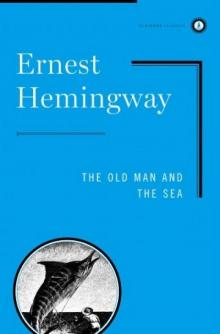 The Old Man and the Sea
The Old Man and the Sea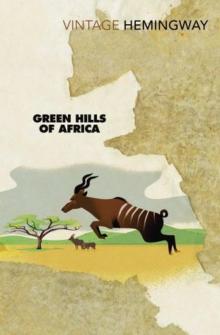 Green Hills of Africa
Green Hills of Africa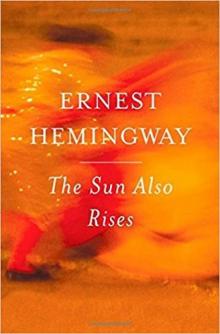 The Sun Also Rises
The Sun Also Rises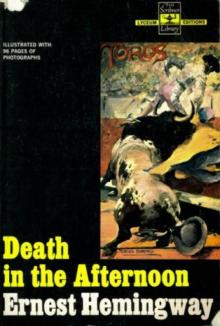 Death in the Afternoon
Death in the Afternoon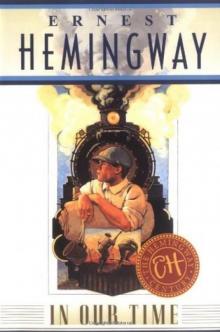 In Our Time
In Our Time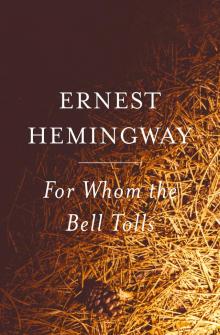 For Whom the Bell Tolls
For Whom the Bell Tolls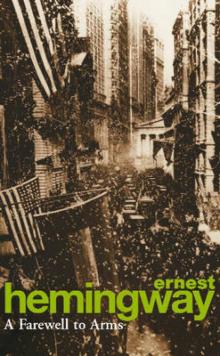 A Farewell to Arms
A Farewell to Arms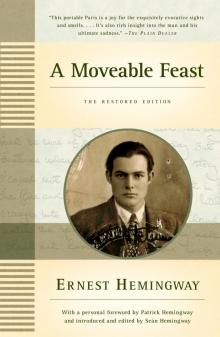 A Moveable Feast
A Moveable Feast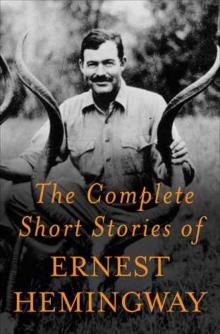 The Complete Short Stories of Ernest Hemingway
The Complete Short Stories of Ernest Hemingway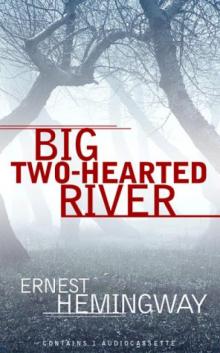 Big Two-Hearted River
Big Two-Hearted River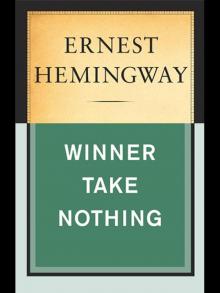 Winner Take Nothing
Winner Take Nothing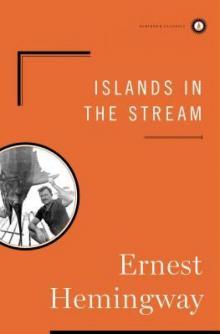 Islands in the Stream
Islands in the Stream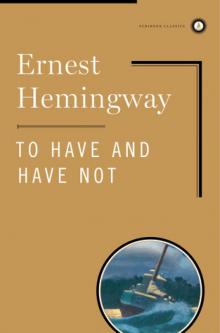 To Have and Have Not
To Have and Have Not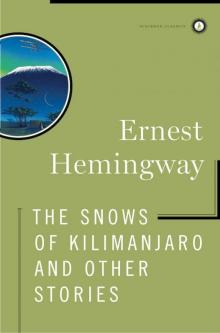 The Snows of Kilimanjaro and Other Stories
The Snows of Kilimanjaro and Other Stories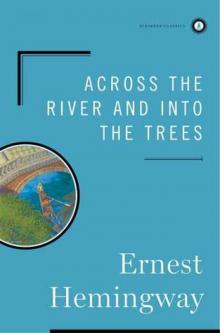 Across the River and Into the Trees
Across the River and Into the Trees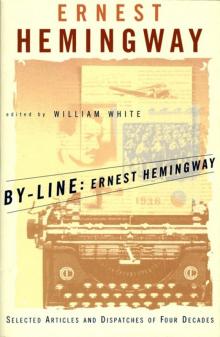 By-Line Ernest Hemingway
By-Line Ernest Hemingway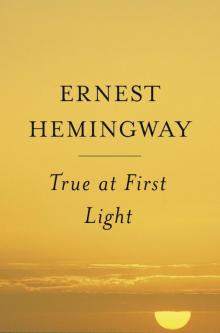 True at First Light
True at First Light Men Without Women
Men Without Women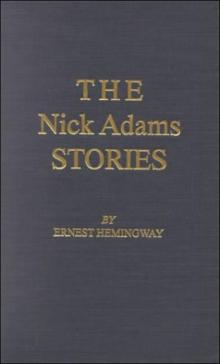 The Nick Adams Stories
The Nick Adams Stories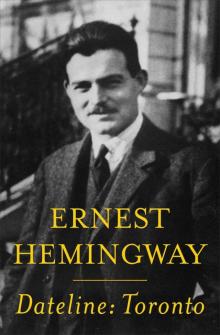 Dateline- Toronto
Dateline- Toronto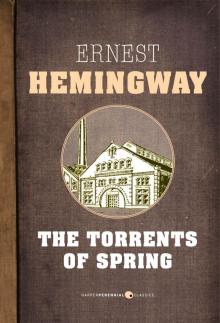 The Torrents of Spring
The Torrents of Spring Short Stories
Short Stories